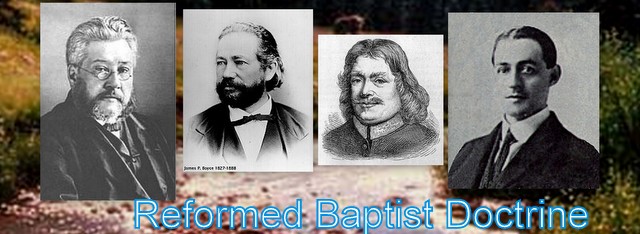The Works of John Gill
 |
|
John Gill (1697-1771) born at Kettering, Northamptonshire, was an English Baptist, a Bible scholar, and a staunch Calvinist. Gill received the degree of Doctor of Divinity from the University of Aberdeen in 1748. He was a profound scholar and a voluminous author. Biographical sketch In his youth, he attended the Kettering grammar-school, mastering the Latin classics and learning Greek by age 11. The young scholar continued self-study in everything from logic to Hebrew. His love for Hebrew would follow Gill throughout his life. About age 12, Gill heard a sermon from his pastor, William Wallis, on the text, "And the Lord called unto Adam, and said unto him, where art thou?" (Genesis 3:9). The message stayed with Gill and eventually led to his conversion. It was not until seven years later that young John made a public profession when he was almost 19 years of age. His first pastoral work was as an intern assisting John Davis at Higham Ferrers in 1718 at age 21. He was subsequently called to pastor the Strict Baptist church at Goat Yard Chapel, Horsleydown, Southwark in 1719. In 1757, his congregation in need of larger premises moved to a Carter Lane, St. Olave’s Street, Southwark. His pastorate lasted 51 years. This Baptist Church later became the Metropolitan Tabernacle and was pastored by Charles Spurgeon. Download: A Summary of the Life of John Gill |
|
All the files on this page are Pdf's These works usually follow this numbering system & are usually together in a book entitled: “Baptism: A Profession of the Faith of the Gospel.” Download this book for all the materials linked here. 10. Baptism: A Profession of the Faith of the Gospel 58. Baptism: A Divine Commandment to be Observed 59. Baptism: A Public Ordinance of Divine Worship 60. The Ancient Mode of Baptizing, By Immersion, Plunging, or Dipping into Water 61. A Defense of a Book Entitled, The Ancient Mode of Baptizing, By Immersion, Plunging,.. 62. The Divine Right of Infant Baptism, Examined and Disproved 63. The Argument From Apostolic Tradition, In Favor of Infant Baptism, Considered 65. An Answer to a Welsh Clergyman's Twenty Arguments 66. Antipaedobaptism; or Infant-baptism an Innovation 67. A Reply to 'A Defense of the Divine Right of Infant Baptism' 68. Some Strictures on Mr. Boswick's Fair & Rational Vindication |
